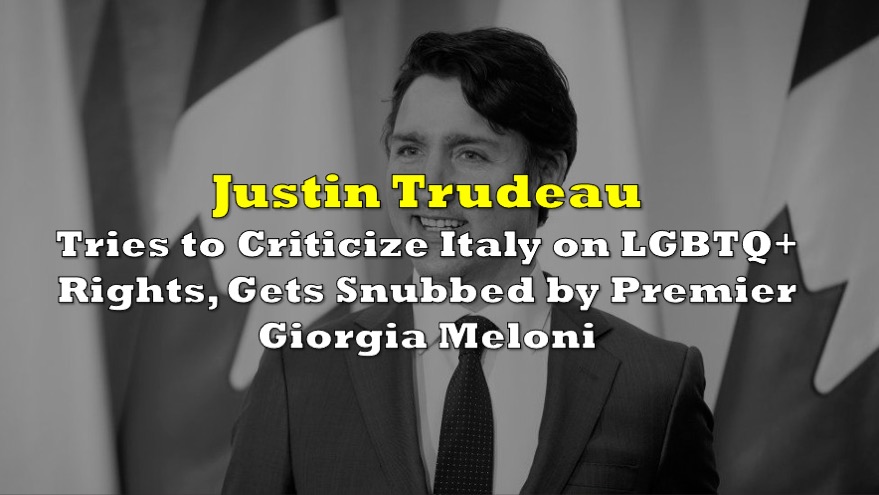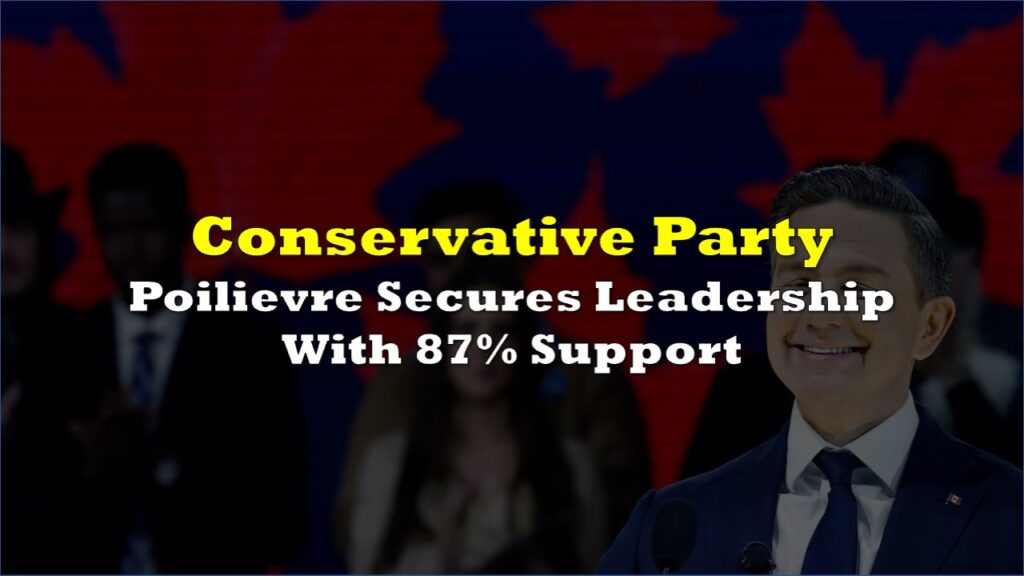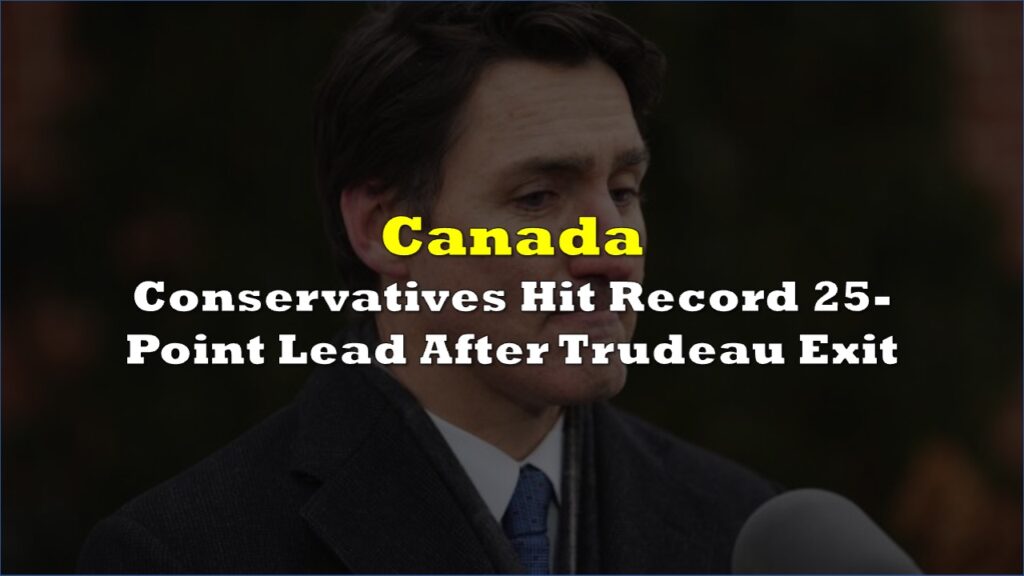Pierre Poilievre, leader of the Conservative Party, launched a blistering attack on the Liberal government, holding Prime Minister Justin Trudeau and his administration responsible for what he called a “record-smashing” increase in poverty rates, following a report that 25% of Canadians now live in poverty.
In a heated session in the House of Commons Poilievre did not mince words, pointing to the Liberal government’s nine-year tenure as a period marked by increasing financial strain on Canadians.
“It’s not partisanship for me,” Poilievre said, referring to criticism from within the Liberal ranks. “His own former Liberal Treasury Board President calls it socialist baffle gab. The tax begins applying on the very first dollar that a small business earns. He’s been promising that raising taxes would make life fair, but we find out today from the Food Banks Association of Canada that now a record-smashing 25% of Canadians live in poverty after nine years of his taxes, deficits, and doubling housing costs. Why is he going ahead with the same whackonomics that caused the poverty in order to solve it?”
A new report from Food Banks Canada suggests the number of Canadians living in poverty may be higher than previously thought, with the organization estimating 25% could fall under this category because they cannot afford two or more household essentials.
The report, released Tuesday, introduced what the authors call a Material Deprivation Index (MDI) — a metric used in Europe to measure a poverty level standard of living. Eurostat, the statistical office of the European Union, says the MDI distinguishes between individuals who cannot afford a certain good or service, and those who do not have this good or service because they don’t want it.
“We should continue to prioritize poverty reduction,” Richard Matern, Food Banks Canada director of research, told Global News. “Many more people are feeling the impacts of poverty.”
According to Food Banks Canada, the MDI looks at 11 types of essential items Canadians surveyed said they could not afford. That includes 10% unable to afford clothing and 18% unable to pay for dental care. From this, the report’s authors suggest 25% of Canadians likely would fall under a poverty-level standard of living because they could not afford two or more such essentials. The report’s methodology indicates that 10 million of Canada’s 40 million people are living in poverty, compared with four million people as reported by Statistics Canada.
Matern said the report also looked at other indicators like food insecurity, reported economic distress, self-reported income adequacy, and actual income levels. “It’s very striking,” Matern said. “When you combine all these four indicators, it basically highlighted statistically that two or more items were most representative of the majority of people experiencing struggles in those other areas as well. So essentially what we call the threshold.”
Trudeau’s defense: “He’s against raising taxes on the wealthiest”
Prime Minister Justin Trudeau defended his government’s record, emphasizing their efforts to support low-income Canadians and address affordability.
“The opposition talks about affordability, but he’s standing against raising taxes on the wealthiest so we can give more supports to those who actually need it,” Trudeau responded. “He’s standing against our school food program which is going to help 400,000 kids across the country have fuller bellies as they study and take the pressure off about $800 a year for families who are pressed with the cost of groceries.”
Earlier this year, the Liberal government released its proposed budget for 2024, which was headlined by capital gains tax increased for corporations and individuals earning beyond a defined threshold. The changes are said to impact the top 0.13% of Canadians as per the federal government, as well as corporations that record capital gains.
“We’re continuing to deliver dental care supports to seniors and, as of next week, to young people and Canadians with disabilities. We’re there for Canadians; he’s voting against it,” Trudeau added in response to Poilievre.
Poilievre further responded, accusing the Liberals of relying on trickle-down economics and increasing taxes, which he argued had failed Canadians. “It has been nine years of this Prime Minister promising trickle-down economics that if he just takes money away from small businesses and workers, it will go from one level of government to another level of government and trickle down.”
He also said that Trudeau “tried to cover up” that a quarter of Canadians are living in poverty, “just like he covered up his own data showing $25 billion of extra cost with the carbon tax—nearly $2,000 in carbon tax coverup for every single family.”
“How can we trust anything he says about taxes, poverty, or money?” Poilievre stated.
Trudeau countered by highlighting the Conservatives’ opposition to measures aimed at reducing inequality, adding that “the leader of the opposition hid for eight weeks while he was trying to come up with an answer to us asking the wealthiest to pay their fair share so we could invest in fairness for every generation.”
“I think he needs to go back to the drawing board because his answer is completely illogical and unfounded,” Trudeau argued. “When it comes to delivering for Canadians struggling with food prices, we’ve got a national school food program that’s going to help 400,000 kids that that party is voting against.”
“Shame on them”
Finance Minister Chrystia Freeland joined the fray, accusing the Conservatives of siding with the wealthy over working Canadians.
“Mr. Speaker, a deception was revealed last week,” Freeland said. “It was the fake pose of the Conservatives to pretend to be on the side of working people… It did not surprise anyone on this side of the House that the Conservatives yet again chose their rich lobbyist friends. Shame on them.”
Conservative MP Jasraj Singh Hallan fired back, criticizing the Liberal government’s handling of economic policies, characterizing Freeland having a “Ph.D. in whackonomics”.
“This proud socialist environment minister’s woke, radical, extreme agenda sent 2 million Canadians into a food bank and one in four into poverty. His government hid a secret report that proves a carbon tax scam cost Canadians an extra $30 billion. If anyone in the private sector covered up a $30 billion loss from shareholders, they’d be fired. So how the hell does this guy still have a job?” Hallan questioned.
Poverty line
When assessing poverty in Canada, the “poverty line” is often referenced by determining an income level for households. Statistics Canada uses a model called the Market Basket Measure to define poverty, which means that a family is considered to be living in poverty if they cannot afford a modest, basic standard of living which includes the costs of food, clothing, transportation, shelter, and other expenses. But Matern says having assets or debt, living in the same apartment with below-market rent, having a disability, or even moving into new housing with above-market rent can all impact the standard of living.
Under that metric, the report said nearly 10% of Canadians currently live in poverty, but authors of the report and those who helped in its development say looking at more than just the “poverty line” could help improve outreach.
“Developing and maintaining an MDI alongside existing income-based poverty measures could provide the government with deeper insights to enhance programs to reach more of those experiencing food insecurity,” said Sarah Stern, the executive director of the Maple Leaf Centre for Food Security, which helped support the report, in a statement.
When it comes to who falls under the MDI as living in poverty, single-parent families and those aged between 18 and 30 were at the top at 44.5% and 30%, respectively. As well, 42% of renters also experience being unable to afford two or more household essentials and live in a poverty-level standard of living. The report suggests “poverty may be more extensive and possibly more multifaceted than it appears when viewed only via an income-based poverty line.”
Information for this story was found via the Global News and the sources mentioned. The author has no securities or affiliations related to the organizations discussed. Not a recommendation to buy or sell. Always do additional research and consult a professional before purchasing a security. The author holds no licenses.









